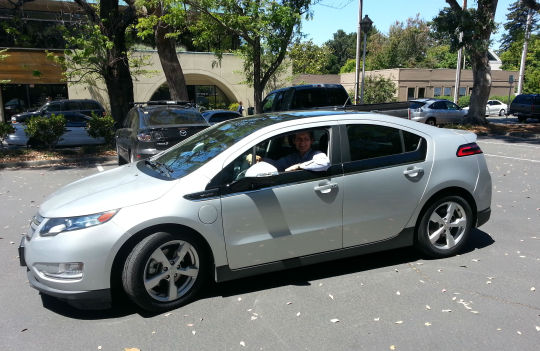by Barry Vesser | Posted June 23, 2015

OK, so I work for The Climate Center. You
might be thinking, “Of course he bought an EV.” But actually, it was a long time
coming, and I ended up with what is more accurately described as a transition vehicle. I did this because I, like many others, am
price sensitive and need a vehicle that can accommodate both my short-range
commutes and my longer-range destinations. Yes, I too am subject to “range” anxiety.
In my quest to find the right car, I found something that I think will appeal
to a lot of people who might not consider themselves a candidate for an
alternative vehicle.
Originally, I thought I might lease a Nissan Leaf or a Chevy
Spark, since there are some very affordable lease deals right now. Although either of these
cars would have worked well for my commute, they would have fallen short for
those occasional travel needs that take me to other parts of the state for work
and family.
After much research and deliberation, I bought a used Chevy
Volt. A recent article noted that it is often cheaper to own an electric
vehicle even over fossil fuel vehicles with cheaper list prices, once you
compare operations and maintenance costs over the first five years. But if you need a longer range vehicle, then the Volt may be for you.
The Volt is technically a plug-in hybrid, but it has a big
battery and gets about 38 miles per charge. When the battery runs down, a
gasoline generator charges the battery and runs the electric motor, extending
the car’s range to 380 miles. When powered by gasoline, it still gets a
reasonable 37 mpg, and if you factor in the electric range, it averages 94 mpg,
pretty gratifying for the carbon-conscious.
The used Volt is also quite gratifying for the economically
prudent. Evidently, as Chevrolet was releasing
a new model of Volt three years ago, there was pressure to move the older cars
off of dealer’s lots, so they were leased at highly favorable rates. Now these
leased cars are being returned to GM and auctioned off to dealers, who are
selling them in the $18- $20,000 range, with whatever remains of the original
100,000-mile/ 8 year battery warranty. Most of these cars are low mileage,
between 20,000 to 40,000, miles and in great condition.
To break it down into real $ terms, I bought this shiny 2012
Volt from the dealer with 20,600 miles on it, like new, for a sticker price of $17,995 (with
an $850 trade-in for my beater Camry).
Financed, my monthly payments are $323 (thanks to Redwood Credit Union).
Since my daily commute is 27 miles round trip, I no longer have to buy gas to
get to/from work. And evidently, I am not alone because the Sonoma County
Transit Authority estimates that the average commute is 17.75 miles – well
within the range of the Volt and the less expensive EV’s on the market. And
because I am an EverGreen customer with Sonoma Clean Power I am running on 100%
local, renewable energy when I do my commute now.
But wait, there’s more. A conservative estimate is that I
will save another $900 a year in gasoline, or almost three months of payments. For
a car with a sticker price in the range of $34,000 plus new, this is a screaming
good deal!
If anyone is concerned about the hassle of charging the car,
it’s really no biggie. There’s no need to install a special charger at home,
because you can trickle charge the Volt battery on a standard 120V outlet in
about 8 to10 hours. If you install a 240V charger, you can cut that down to four
hours.
To put this value in perspective, a new Plug-in Prius costs
about $28,000, and according to Toyota, you will get a full electric range of
just 11 miles.
The Volt is not just for eco-warriors. As Car and Driver says in their review of
the car: “Despite the Volt’s eco-minded image, it’s actually
gratifying to drive—just don’t expect mind-blowing acceleration.”
The back seat is a little tight for legroom
and only seats two, but that seems to be the only real drawback of this car
that drives like a well-designed, high-end sedan with a sporty feel and has
great safety features.
So, get out there and do some test
driving. If you find one out of lease, you will get a great deal on a car rated
“very good” by Consumer Reports, that can dramatically reduce the cost of your
commute and your carbon footprint.
Barry Vesser is Deputy Director for The Climate Center and coordinates the Center’s Business for Clean Energy Program.

